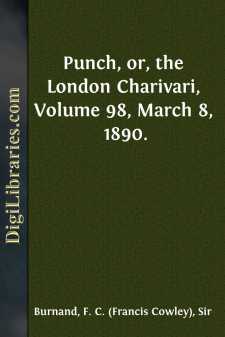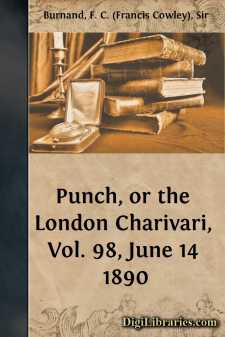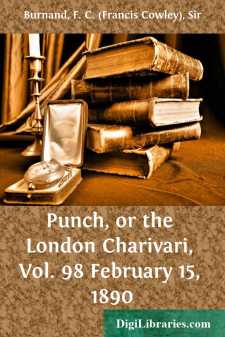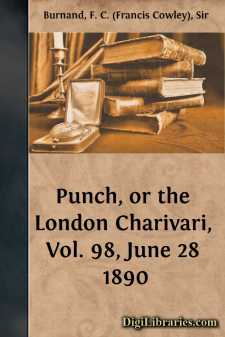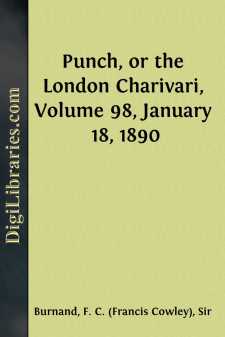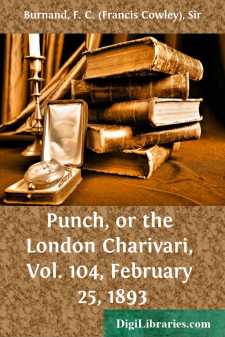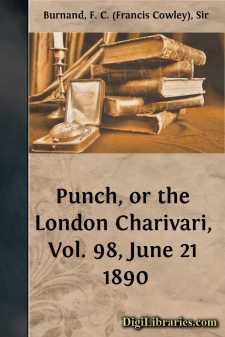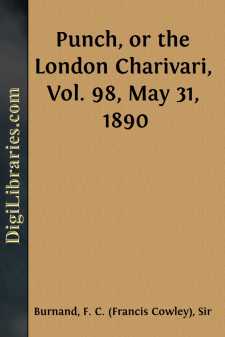Categories
- Antiques & Collectibles 13
- Architecture 36
- Art 48
- Bibles 22
- Biography & Autobiography 813
- Body, Mind & Spirit 142
- Business & Economics 28
- Children's Books 17
- Children's Fiction 14
- Computers 4
- Cooking 94
- Crafts & Hobbies 4
- Drama 346
- Education 46
- Family & Relationships 57
- Fiction 11829
- Games 19
- Gardening 17
- Health & Fitness 34
- History 1377
- House & Home 1
- Humor 147
- Juvenile Fiction 1873
- Juvenile Nonfiction 202
- Language Arts & Disciplines 88
- Law 16
- Literary Collections 686
- Literary Criticism 179
- Mathematics 13
- Medical 41
- Music 40
- Nature 179
- Non-Classifiable 1768
- Performing Arts 7
- Periodicals 1453
- Philosophy 64
- Photography 2
- Poetry 896
- Political Science 203
- Psychology 42
- Reference 154
- Religion 513
- Science 126
- Self-Help 84
- Social Science 81
- Sports & Recreation 34
- Study Aids 3
- Technology & Engineering 59
- Transportation 23
- Travel 463
- True Crime 29
Punch, or, the London Charivari, Volume 98, March 8, 1890.
Categories:
Description:
Excerpt
Yesterday, before the Theatres Committee of the London County Council, the appeal of Mr. Henry Irving (the well-known actor and manager) against the decision of the Sub-Committee to refuse a licence to the Lyceum Theatre, came on for hearing.
After Mr. Henry Irving (who appeared in person) had addressed the Committee at some length, dwelling upon the character of the pieces he had produced during his management, and the care and expense with which they had been mounted, several members of the Committee expressed a wish to put questions to him, which Mr. Irving promised to answer to the best of his ability.
Mr. Hecklebury. I think you told us that Hamlet was one of your favourite parts? Is it not the fact that the chief character in the play drives his fiancée to madness and suicide by his cruelty, slays her father and brother, together with his own step-father, and procures the death of two of his school-fellows?
Mr. Irving admitted that this was so. (Sensation.)
Mr. Hecklebury. That is all I wanted to ask you.
Mr. Fussler. I understand that you have produced a play called Othello on more than one occasion; perhaps you will inform us whether the following passages are in your opinion suitable for public declamation? (Mr. Fussler then proceeded to read several extracts to which he objected on account of their offensive signification.)
Mr. Irving protested that Shakspeare, and not himself, was responsible for such passages.
Mr. Fussler. Unfortunately, Shakspeare is not before us—and you are. You admit that you have produced a play containing lines such as I have just read? That is enough for Us.
Mr. Medlam. Unless I am mistaken, the hero in Othello is not only a murderer but a suicide?
Mr. Irving. Undoubtedly. (Sensation.)
Mr. Medlam. We have heard something of a piece called The Bells. I seldom attend theatres myself, except in the exercise of my public functions, but I do happen to have seen that particular play on one occasion. Does my memory mislead me in saying, that you committed a brutal and savage murder in the course of the drama?
Mr. Irving said that, as a matter of fact, the murder took place many years before the curtain rose—otherwise, the Member's memory was entirely accurate.
Mr. Medlam. Whenever the murder was committed, it remains undetected, and the criminal escapes all penalty—is not that the case?
Mr. Irving urged that the Nemesis was worked out by the murderer's own conscience.
Mr. Medlam said that was all nonsense; a person's conscience could not be made visible on the stage, and here a murderer was represented as dying several years after his crime, in his own bedroom, respected by all who knew him. Did Mr. Irving intend to tell them that such a spectacle was calculated to deter an intending murderer, or did he not? That was the plain question.
Mr. Irving thought that intending murderers formed so inappreciable an element in his usual audiences, that they might safely be left out of the calculation.
Mr. Medlam. But you might have an intending murderer among your audience, I suppose?
Mr. Irving's reply was not audible in the reporters' gallery.
Mr. Parseeker. I should like to hear what you have to say about duelling, Mr. Irving—I mean, is it, or is it not, a practice sanctioned by the laws of this country...?


